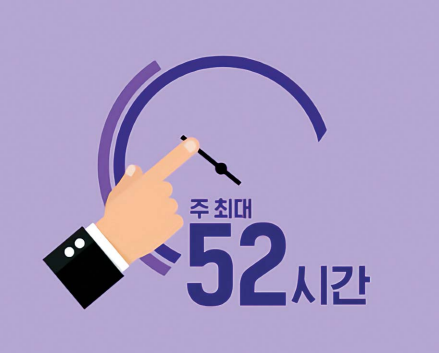Having a life in the evening, which means having free time after the work day, has become an important consideration when choosing a job. According to the results of a survey conducted by Saramin, the job matching platform, 73.3 percent of office workers in Korea said that a work environment that allows them to maintain work-life balance is more important than salary. Most people in their 20s and 30s put their leisure time more important than income or fame. To meet these needs, the new system 52-hour workweek was brought into effect starting last year. Before the revision, the legal working hours were total 68 hours. It is the sum of 40 hours a week, 16 hours of holiday work and 12 hours of overtime work. The 52-hour workweek system refers to this revision of the Labor Standards Act, which removes 16 hours of holiday working hours from the 68 hours. The implementation timing depends on the size of the workplace. Excluding the exceptional 21 industries, businesses with 300 employees or more have been in effect since July last year. From July 1st this year, the labor hours have also been shortened to the excluded sectors. Businesses with fewer than 300 employees and more than 50 employees will be implemented from January 2020, and those with less than 50 employees will be implemented in 2021. However, there are concerns about moneyless evenings. With shorter working hours, it is inevitable to reduce income due to fewer holiday and night-work hours. After all, the 52-hour workweek might lead to more free time, but that doesn’t mean we can afford to enjoy it. In particular, the regulation of working hours could weaken the nation's industrial competitiveness amid Japan's growing export restrictions. So here, CAH looked into the opinions of both sides of the 52-hour workweek.

Workaholism. This is a common symptom around us. A workaholic generally refers to an overworked person whose work takes up a large part of his or her life. The reason for hard work may attributed to psychological traits. However, in fact, it is also the result of encouragement from the performance-oriented social atmosphere. According to the OECD, the average annual working hours per Korean worker in 2016 are 2,069 hours. In other words, Koreans have been working in excess of about 400 hours, comparing with the OECD average of 1,700 hours. This is the result of reducing work hours as the five-day workweek was implemented in 2004, but Korea still has the second longest working hours. At this point, the 52-hour workweek has brought changes to the current society. This is not only necessary for workers, but also for businesses and for society.
First, the 52-hour workweek is necessary for workers. As mentioned earlier, it is no exaggeration to say that Korea is a workaholic society. The World Health Organization(WHO) in May this year named the stress resulting from work addiction as “Burnout Syndrome,” judging it as a factor that could affect health conditions. According to the survey of 492 office workers by Job Korea, an employment portal, 95.1 percent said they suffered from Burnout Syndrome. The majority of workers have experienced mental and physical fatigue, and these actually lead to extreme health problems. In May, a group of mailmen warned of a strike, demanding more workers and a five-day workweek. The average annual average working hours of the mailmen are about 693 hours longer than those of similar workers, according to the 2018 Joint Committee for the Improvement of Labor Conditions. This overwork is leading to even death. Since 2010, 82 people have died from overwork. The number of safety accidents of mailmen increased about twofold from 389 in 2017 to 781 last year. With 1 percent reduction in working hours, the rate of industrial accidents could lower by 3.7 percent, according to the National Assembly Budget Office in 2017. As such, The 52-hour workweek is the starting point for workers to live like human beings in modern society. It is needed to improve the quality of people’s lives.
Second, the 52-hour workweek is also necessary for businesses. It provides an opportunity to improve labor productivity. In fact, Korea's annual working hours are in the upper ranks, but its labor productivity is in the lower ranks. The OECD's hourly labor productivity, announced in 2017, averaged $47.1 per hour, but Korea's was only $34.3. That is why businesses need to make efforts to improve their low labor productivity. One of the efforts is to reduce working hours. Long hours of work do not increase the productivity and efficiency of work. Instead, according to a recent report by the Korea Development Institute on the impact of shorter working hours on labor productivity, manufacturers with 10 or more workers saw their labor productivity improve 1.5 percent annually on average due to reduced working hours. In fact, many companies are trying to cut off inefficiency and improve labor productivity. According to a report surveying 144 companies by the Korea Economic Research Institute in June, 68.8 percent of the companies adopted measures to improve their work efficiency through shorter working hours. For example, Samsung Electronics introduced a system that allows office employees to select their own working hours. Nexon is free to commute to and from work when it meets 40 hours a week, except for the designated mandatory working hours. In other words, the 52-hour workweek is a system that gives companies the opportunity to think of the method to improve their labor productivity.

Third, the 52-hour workweek has apositive social impact as well. We can expect the effects of job creation. Assuming existing workers' working hours and salaries at 100, the implementation of the five-hour workweek would reduce them by as much as 30. The logic of the system is that employers would seek to create jobs by giving 30 percent of their working hours and salaries to new workers. According to the Social and Economic Effects of the 52-hour Workweek by Kim Yoo-sun, a senior researcher at the Korea Labor and Social Research Institute, the 52-hour workweek could increase the number of jobs from at least 130 thousand to 160 thousand. In addition, it could have positive impact on leisure-related industries as people can enjoy their life in the evening. Recently, industries centered on leisure have been reviving in line with the Work-Life Balance trend. According to BC Card's analysis of sales big data for a month, sales in Seoul related to leisure activities increased 92 percent compared to the same period a year earlier. On the other hand, some are concerned about the cost of additional employment and the reduction of workers' wages. In response, however, the government has proposed supplementary measures such as ‘job sharing project’. It is to help companies that have achieved reduction in working hours or job creation with new employees and to preserve the employees’ wages who have been working.
In 2000, the French government implemented the Aubry Act, similar to Korea's 52-hour workweek. This is a system named after Martine Aubry, the minister of social employment, who reduced working hours from 39 hours to 35 hours. The government simultaneously implemented financial support for companies that reduced working hours by more than 10 percent or maintained the hiring of more than 6 percent of new workers. This is said to have created about 240,000 jobs in France. Of course, it is true that confusion is inevitable as a result of changing the system. That said, such confusion does not deny the need for shorter working hours. In modern society, the 52-hour workweek is necessary for workers, businesses and society. Therefore, the need for a 52-hour workweek should be acknowledged and continued.

Kwak Da-eun
dashineshere@cau,ac.kr

